| Author |
Message |
    
andrew
Moderator
Username: andrew
Post Number: 1327
Registered: 11-2001

| | Posted on Thursday, January 12, 2006 - 01:07 pm: | 




|
The following came in by email. I will ask Dana to check her for responses, and add additional info if possible... neat project! 
She doesn't actually say what engine it is... maybe she can post the nameplate data below.
quote:Hello,
My name is dana wolfe hildebrand and I am the Great Granddaughter of JW Whitlock, an early boat designer/racer (The Hoosier Boy, most notably). I'm on the Board of Directors for the Ohio County Historical Society in Rising Sun, Indiana and we house The Hoosier Boy -- and now The Hoosier Girl. When the Hoosier Girl came in, her engine came separate. In the past two years, the engine has become very rusty. Now, our facilities are sincerely lacking and space is at a premium. The garage in which the engine, and the two boats, are housed leaks air from the outside, though there appears to be no leaks in the roof.
Nevertheless, the engine is being eaten away very quickly and we wanted to elicit some advice from those who know more than we do, hence this letter. Do you have any words of wisdom for us? We would sincerely appreciate any thoughts you might have on the subject.
I'm sending you a rather large picture of the engine, but I thought you might want to see the details. We have to maintain the integrity of the artifact, while at the same time, making sure that it doesn't fall apart on us!
Most sincerely,
dana wolfe hildebrand
[email protected]
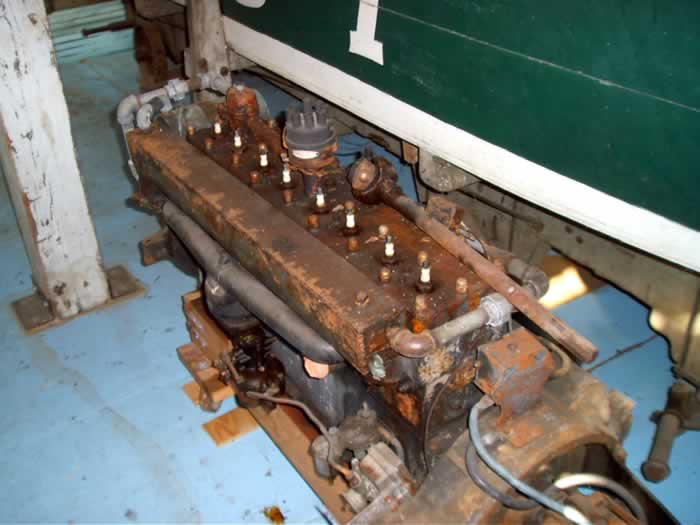 |
    
miro
Senior Member
Username: miro
Post Number: 205
Registered: 11-2001
| | Posted on Friday, January 13, 2006 - 04:53 pm: | 




|
The exterior is really not an issue. It is the cylinder walls and the crankcase that matter most.
If you can, make sure there is no water in either the cylinders or the crankcase.
If there is water, see if you can dry it out. For the cylinders, blow compressed air in using a short tube - like a lance to get dry air in there though the spark plug hole.
For the crankcase, there may be a breather or the certainly the valve guide covers will come off, so that you can have a look-see ( hopefully there is residual oil in there only)
I would NOT try to turn the engine flywheel just yet.
For more major invasive efforts, the head would have to be removed - not a trivial excercise.
I have found that WD40 will displace water quite well.
Looks as if you have a good project on your hands.
miro |
    
dana wolfe hildebrand
Visitor
| | Posted on Friday, January 13, 2006 - 09:34 pm: | 




|
Hi all...
I'm going to see if I can get you some more info off the motor this weekend. I should have said we are not planning on restoring the motor; instead, we are a museum that believes in letting the artifact alone. However, in this case, the rust is rapidly spreading. If we don't do something, there will be no artifact left to preserve. Everything is touched with gloves, even this motor. But, we MUST do something....... |
    
dana wolfe hildebrand
Visitor
| | Posted on Friday, January 13, 2006 - 09:37 pm: | 




|
Here's a pic of the Hoosier Girl in its hey dey.
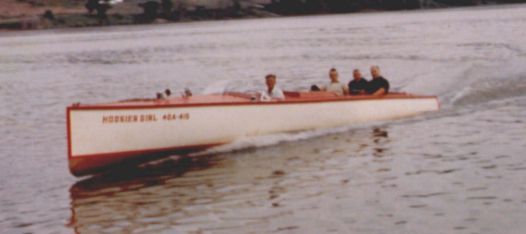 |
    
dana wolfe hildebrand
Visitor
| | Posted on Friday, January 13, 2006 - 09:50 pm: | 




|
I do have a partial pic of a tag that's on the engine, if it helps anyone ???
dana
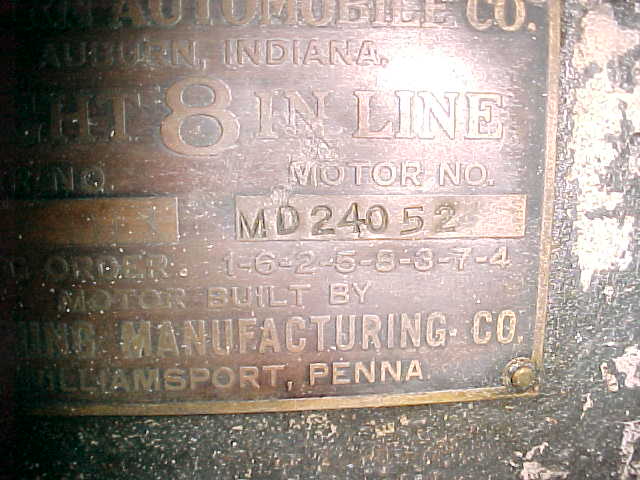 |
    
andrew
Moderator
Username: andrew
Post Number: 1331
Registered: 11-2001

| | Posted on Saturday, January 14, 2006 - 10:57 am: | 




|
Dana,
Thanks for posting the additional info. Can you get the rest of the data off the name tag above and post it here? If so we can probably supply additional info on the engine. I assume that the bottom part says
"MOTOR BUILT BY LYCOMBING MANUFACTURING CO., WILLIAMSPORT, PENNA"
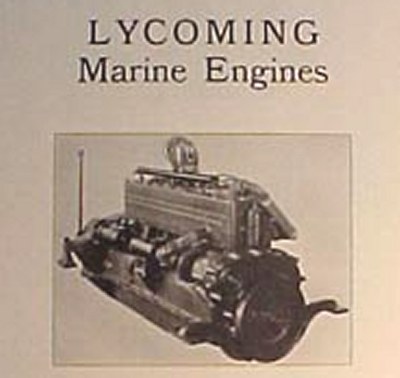
Others here could give you more detailed info than I can... but you are correct that the engine could deteriate quickly if you do nothing. In order to preserve it you will have to do some work on it. Done properly you will not be disturbing it's original characteristics.
As Miro mentiones you must make sure that the cylinders, crankcase, and cooling water passages (maybe the most difficult) are free of water and coated with oil or penetrant, and the water passages are plugged and fully filled with anti-freeze or other rust inhibitor.
You will need the assistance of the right mechanic or old engine nut. Maybe one of the regulars here lives near your location, or maybe you might have to find the right person in your organization or locally.
If you are only tying to make a static display it is not going to be too difficuly, but you still must address the rust that is likely occuring from the inside of the engine. |
    
dana wolfe hildebrand
Visitor
| | Posted on Saturday, January 14, 2006 - 11:06 am: | 




|
Does anyone have an idea of how old (year) this engine is? |
    
dana wolfe hildebrand
Visitor
| | Posted on Saturday, January 14, 2006 - 11:16 am: | 




|
Thank you, Miro and Andrew, for the good advice!
OK...I'm going to show my ignorance here, but I'm happy to do so in the interest of information! I understand that the Lycoming Co. made marine and car engines. Which do we have here? The other boat (The Hoosier Boy) has a Liberty aircraft engine in it. Even if we can't afford to do what we need to do to the Girl's engine, it would be wonderful to get any historical information that might be out there. I'm relying heavily on others -- experts like all of you!!
Thanks.........d |
    
bruce
Senior Member
Username: bruce
Post Number: 301
Registered: 07-2002
| | Posted on Saturday, January 14, 2006 - 12:32 pm: | 




|
Dana, as a race boat engine installation; this motor could well have been installed in a v-drive configuration. Note the splined drive shaft with the universal joint. It is also possible that a marine gear was not installed in order to save weight. The hull drawings if still in the family would give a clear picture of the intended design. I would hope that something good soon comes to this wonderful example of racing history. I suggest contacting the American Power Boat Association : APBA.com They have extensive records in their Antique racing division. Also raceboat authority Thomas Mittler at [email protected] who isn't far away in Indiana. |
    
dana wolfe hildebrand
Visitor
| | Posted on Saturday, January 14, 2006 - 07:33 pm: | 




|
Here's another one that the museum has always had, but no one seems to know anything about it. It says "Scripps" on the tag.
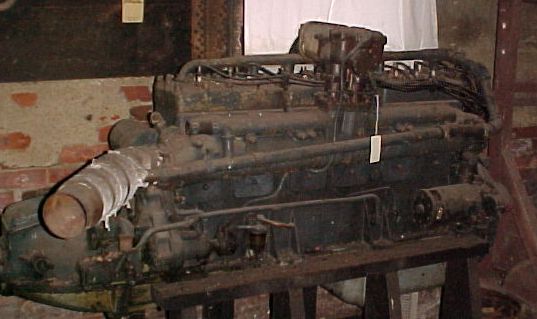 |
    
dana wolfe hildebrand
Visitor
| | Posted on Sunday, January 15, 2006 - 01:29 pm: | 




|
Ok, the two posts following will have the information on the two engines. First, here's the rest of the tag from the Hoosier Girl motor:
 |
    
dana wolfe hildebrand
Visitor
| | Posted on Sunday, January 15, 2006 - 01:35 pm: | 




|
.....and here's the tag from the Scripps motor.
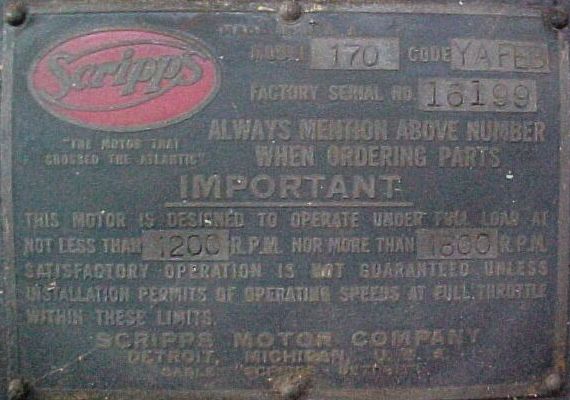 |
    
dana wolfe hildebrand
Visitor
| | Posted on Sunday, January 15, 2006 - 01:39 pm: | 




|
A little info I found about the engine at the museum. Anyone got anything more for me? Thanks!
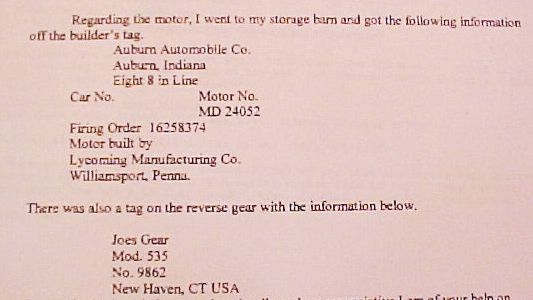 |
    
bruce
Senior Member
Username: bruce
Post Number: 303
Registered: 07-2002
| | Posted on Sunday, January 15, 2006 - 03:26 pm: | 




|
Dana, Contact Robert Henkel at [email protected] The Henkel family purchased the remains of the Scripps Engine company years back and are a recognised authortity on Scripps marine engines. Sorry, I couldn't see the Joes gear in the Auburn/lycoming picture from before. |
    
foxman
Visitor
| | Posted on Sunday, January 22, 2006 - 07:40 pm: | 




|
Dana
I was very interested to read about your project. I don't know much about Hoosier Girl but my eyebrows went up when you said your organization has Hoosier Boy in its collection!
Is this the 40 foot long displacement hull Gold Cup raceboat that appeared several times in the 1910 Power Boating Magazine?
In 1910 the Buffalo Engine Company built two prototype 250 hp V-8 engines, modelled to some degree on the Crane-Whitman engine from Dixie II. One was installed in Hoosier Boy and the other in a boat from our area (Brockville Ontario) another 40 foot Gold Cup displacement raceboat called the "Insurgent".
Hoosier Boy got the good engine and won a number of races, Insurgent evidently got the dog; its engine exploded shortly before 1910 Gold Cup trials began. It would be great if you could post current pictures of Boy and Girl and even more so on the million to one chance that Boy still has its original Buffalo powerplant.
Hoosier Girl was apparently altered to a foward drive configuration in the 1930's judging by the photo, however, it still has a nice trim at speed. About your engine project; generally maintaining mechanical artifacts in original condition is problematic since unlike household memorabilia which is stored indoors, most boats and engines were left outdoors to rust and rot in the 1930's and 40's so this environmental damage is not indicative of its original appearance while in use. A little restorative TLC is imperative in maintaining essentially perishable items like old boats and motors and rather than diminshing their value ( as it would in the case of an original condition cabinet or bed) actually adds to the educational value of the item.
Thank you for you interesting article and best of luck with your projects. |
    
andrew
Moderator
Username: andrew
Post Number: 1351
Registered: 11-2001

| | Posted on Sunday, January 22, 2006 - 07:52 pm: | 




|
See this link for an article that Dana wrote about Hoosier Boy.
 |
    
dana wolfe hildebrand
Visitor
| | Posted on Sunday, January 29, 2006 - 06:32 pm: | 




|
Foxman,
No, the Hoosier Boy that we have is the last of the line. There were five Boys, and the one we have is a 24 foot, stepped craft with a Libery onboard. There were two of the 40 foot displacement crafts, one of which was sold to someone in New York. The Girl, though, was modeled after the early Boys. The Boy's number was (and is) K-780, while the Girl's original number was K-781. Here they are...

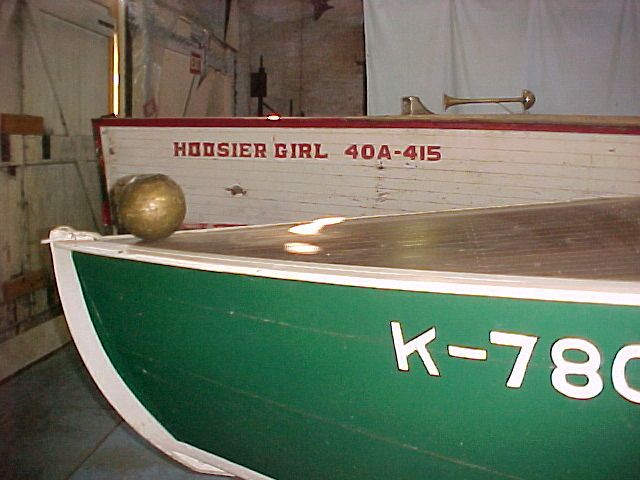 |
    
dana wolfe hildebrand
Visitor
| | Posted on Sunday, January 29, 2006 - 06:37 pm: | 




|
Here's one of the original Boys for you! 
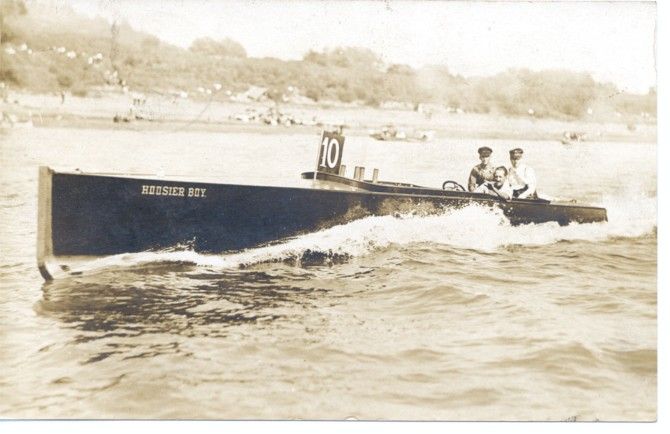 |
    
Scott Peters
Visitor
| | Posted on Monday, February 13, 2006 - 01:37 pm: | 




|
Hi Dana,
You might want to contact the Collections department at the Auburn-Cord-Duesenberg Museum, 1600 S. Wayne Street, Auburn, Indiana 46706 phone (260) 925-1444, to see if they have a production record for that Auburn engine. They also have lots of technical manuals and files related to the company. Good luck! |
    
dana wolfe hildebrand
Visitor
| | Posted on Friday, May 19, 2006 - 08:43 am: | 




|
Update from dana:
Well, I've finally found out what what boat the Scripps engine was in. It was one of my Great Grandfather's boats -- the Greyhound. Here's a shot of her......She's the big one in the back.
 |


